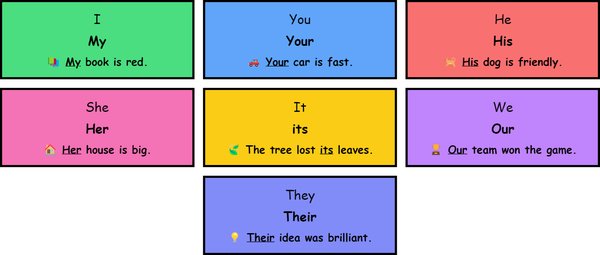Possessive Adjectives
What Are Possessive Adjectives?
Possessive adjectives are words used to indicate ownership or possession of an object or person. They modify nouns and always come before the noun they’re describing. In English, the possessive adjectives are:

- my
- your
- his
- her
- its
- our
- their
Forms of Possessive Adjectives
Here are the cards showing the possessive adjectives and their corresponding personal pronouns:

Usage Rules
-
Position: Possessive adjectives always come before the noun they modify.
- Example: “This is my book.”
-
No Apostrophe: Unlike possessive nouns, possessive adjectives do not use an apostrophe.
- Example: “Her car is red.” (Not “Her’s car is red.”)
-
Agreement: The possessive adjective agrees with the possessor, not the object possessed.
- Example: She loves her ring. (The object being possessed is “ring,” but the possessive adjective agrees with the subject “she”, not with the object.)
-
Unchanging Form: Possessive adjectives do not change form based on the number or gender of the noun they modify.
- Example: “These are our books.” (Not “ours books”)
Common Mistakes and How to Avoid Them
-
Confusing “Its” and “It’s”:
- “Its” is the possessive adjective.
- “It’s” is the contraction of “it is” or “it has”.
- Example: “The cat licked its paw.” vs. “It’s raining outside.”
These words are common homophones that often cause confusion.
-
Using Possessive Pronouns Instead of Adjectives:
- Incorrect: “That book is mines.”
- Correct: “That book is mine.”
Remember, possessive pronouns replace nouns, while possessive adjectives modify them.
-
Redundant Possessives:
- Incorrect: “This is John’s his book.”
- Correct: “This is John’s book.” or “This is his book.”
Advanced Usage and Exceptions
-
With Gerunds: Possessive adjectives are often used before gerunds.
- Example: “I appreciate your coming to the party.”
-
In Expressions of Time: Some time expressions use possessive adjectives.
- Example: “See you in a week’s time.”
-
With Parts of the Body: English often uses “the” instead of possessive adjectives for body parts.
- Example: “She raised the hand.” (Instead of “She raised her hand.”)
Key Takeaways
- Possessive adjectives show ownership and come before the noun they modify.
- The form of the possessive adjective agrees with the possessor, not the object possessed.
- Common mistakes include confusing “its” and “it’s” and using possessive pronouns instead of adjectives.
- Possessive adjectives have some special uses with gerunds and time expressions.
- Practice and awareness of common pitfalls will improve your use of possessive adjectives.
FAQs
What’s the difference between possessive adjectives and possessive pronouns?
Possessive adjectives (my, your, his, her, its, our, their) come before nouns and modify them, while possessive pronouns (mine, yours, his, hers, its, ours, theirs) replace the noun entirely. For example:
- “This is my book.” (possessive adjective)
- “This book is mine.” (possessive pronoun)